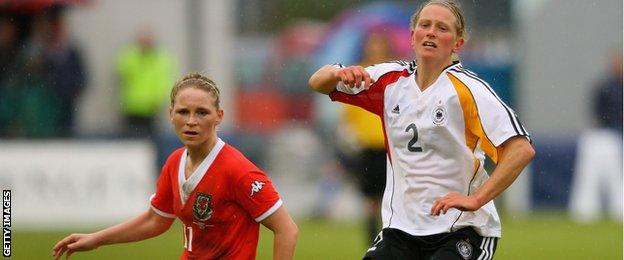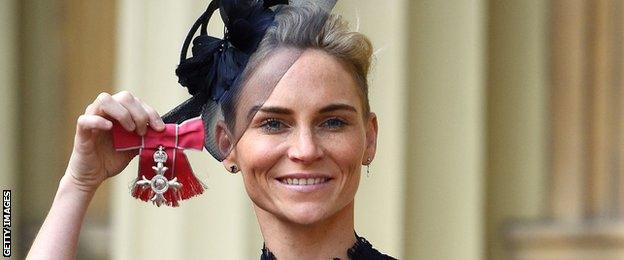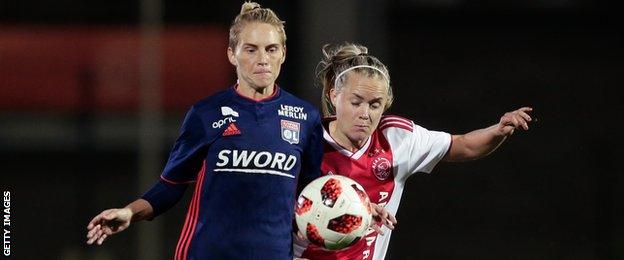Jess Fishlock: Wales' most capped player says 'school was hell on earth'
- Published
Jessica Fishlock says she has a duty as a role model to fight sexuality stigmas in sport
Wales' most capped footballer, Jess Fishlock, talks to Beth Fisher for BBC Wales Live about her experiences of growing up in Wales and the responsibility she feels as a role model for children.
Wales' most decorated footballer, Jessica Fishlock MBE says her experience at school was "hell on earth" because of abuse over her sexuality.
Fishlock, who has played 113 times for her country, says her experiences growing up have made her determined to be a role model in the LGBT community and especially for children.
The 32-year-old Seattle Reign and Olympique Lyon midfielder says there remains an assumption about the sexuality of women who play football and believes better education is the key to change.
High School was 'hell on earth'
"High school for me was hell on earth," Fishlock recalls.
"It was everything I hated about everything. I was personally going through stuff that I didn't understand that I needed to figure out.
"And then you are around people your age who are going through their own stuff, and the first thing that kids do when they are under pressure or don't understand something is they throw stuff, whether it be verbally, mentally, they don't even know they are doing it.
"So for me, growing up, especially high school was hell on earth. I had all these problems. I was very active, very sporty, short hair at that time. And I went through so many unnecessary things, like 'why is she in the girls changing room?'
"[People saying] she shouldn't be in the girls changing room. It wasn't great. It was hard for me, but I don't want anybody to go through that so there has to be things that we need to change."

Jess Fishlock made her Wales debut in 2006 as a 16-year-old
'I knew from a young age I loved women'
Fishlock says her sexuality never scared her in adolescence, but that she soon realised society was less accepting than she was of the fact she was gay.
"I think I knew when I was 12 that I love women, right? Whatever," she says.
"I remember the moment clear and I wasn't mad about it. Like it was OK. But the biggest thing for me was trying to manoeuvre my life with knowing that information. It wasn't something I was scared of.
"It wasn't something that I just disliked and made me dislike myself for who I was. But I didn't understand why it was such a negative thing. That's where for me it was something that I just couldn't really stand. You know, does it matter?
"Even at a very young age going through that, 20 years ago, I never understood why it was a problem. And it's even worse now. I don't understand the problem.
"The turning point for me was when I just realised that I wasn't the problem. The problem was the society in school. Not the kids in school because they don't understand; the society and the thought process around it was the problem."

Jess Fishlock helped Wales to their best ever qualifying campaign in 2018
'Having to live a lie is one of the worst things'
Fishlock says there are huge assumptions made about women who play football.
"For me if you play football and you're a woman, 90% of people automatically straight away think you're a lesbian," she said.
"Kids shouldn't lock themselves in their room or try and hide away from their family and be alone.
"The worst thing you can do when you go through this stuff is to be alone, and they don't have to anymore and I think that's where we can start to make a change.
"The biggest change is going to happen when people start hurling abuse and they realise it doesn't do anything anymore.
"It's not 50 years ago when if you called someone lesbian or gay or whatever words people wanted to use, it might have offended, it might have hurt people, like really really hurt people and made them change their entire lives.
"And shame on those people because having to live a lie is one of the worst things in the world. But now I don't believe that happens so much. I think if people say that, girls and boys will just turn around and be like 'and?' Yeah I'm gay. It's your problem not mine.
"That will end up squeezing it out. The only reason people say it is to hurt someone. When they realise it just doesn't hurt anybody anymore, they will move on."
'I am a very normal person. I am just a lesbian, that's it'
Fishlock says education is the key to changing the way society acts towards people in the LGBT community and that she feels a responsibility to use her platform to raise the issue.
"A lot of it is education. And a lot of it is just understanding," she said.
"Coming out publicly was a very big decision for me.

Jess Fishlock was awarded an MBE for services to women's football and the LGBT community
"I'm not the only one that gets abused. I am not the only one that gets comments thrown at them. It's come round to my family and my sisters and my mum and my dad, so when I made that decision, you know I have to think about other people as well otherwise it's very selfish of me.
"But there really is a big picture, and the bigger picture is generations of kids looking at a role model, looking at what they've achieved and understanding whatever they are going through.
"We've all been through it and we understand how hard it is. So they can relate to us and understand that it's not wrong, there's no difference, you are just a human being and you are normal, despite what people say. People say, 'oh she's not normal' - I am completely normal."
'Sometimes I don't want to fight'
Fishlock believes people's individual fears are the reason for antiquated views on sexuality, but admits it can be exhausting fighting prejudice.
"I just don't get why it needs to happen or why it needs to be a thing," she said.

Now representing Lyon and Seattle Reign, Jess Fishlock's career has seen her play in six different countries
"People like myself that are in the public eye, we have to keep fighting to help save lives.
"I haven't heard the word 'dyke' for a long time, but when I did it was always on Twitter.
"At one point I deactivated my Twitter because it was kind of similar to school, the environment was not good for me, so I took myself out of it.
"And sometimes you've just got to do that. I can fight all the time, but sometimes I don't want to fight.
"You can't change everybody, so sometimes you've just got to go 'I'm just stepping away from that fight'… for my sanity."